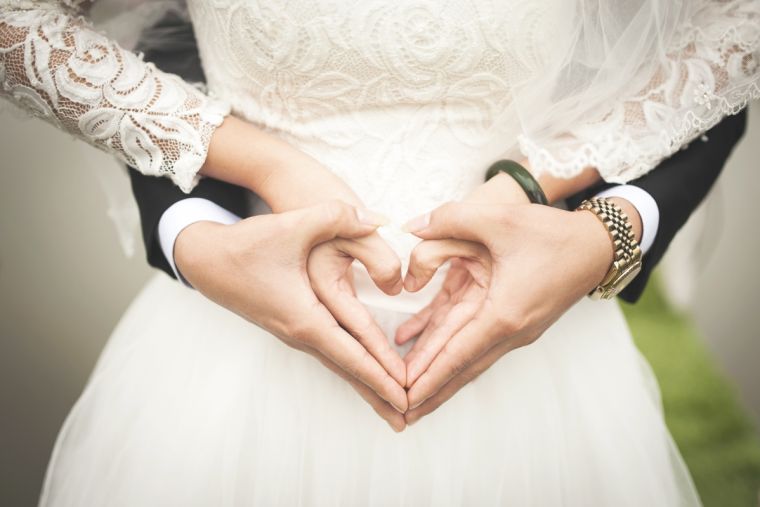Marriage is a gift from God: Why Christians must stop getting so hung up on who weds who
'Marriage is a wonderful institution, but who would want to live in an institution?'
HL Mencken's quip is amusing, but not really an accurate reflection of UK or US society. Even in a culture where cohabitation has lost its stigma, marriage is still very popular. Admittedly rates are falling in the US, but there's been a slight rise in the UK – more than half a million people got married in 2014. People really do want to plight their troth and signify their commitment to one person forever.

What happens if you want to do that, but you don't want to get married? If you're a same-sex couple, you can have a civil partnership. But if you're an opposite-sex couple, you can't – it's marriage or shacking up.
Now a heterosexual couple has been granted the right to challenge that in the Supreme Court. Rebecca Steinfeld and Charles Keidan believe they should have the right to have a civil partnership too.
Steinfeld has previously said marriage has a 'problematic history from the point of view of female-male relations'.
'Some might refer to it as a patriarchal social institution,' she told the BBC. 'Some of that history lingers on, for example that marriage certificates still only have space for the fathers of the parties and not the mothers.
'We don't feel comfortable with that and we feel we should have a choice.'
It's tempting to see this as yet another assault on an institution (Mencken again) that Christians and social conservatives see as the bedrock of society. Actually, it isn't – the couple object to the baggage that comes with the word, and they have a point. It's easier to point to their assumption that they have a right to a choice and ask, 'Why?' We can't always get what we want; a YouGov poll last week found almost one in eight men would like a polygamous marriage, and that's not going to happen.
But underlying both this case and the huge problems many conservative Christians had with the introduction of same-sex marriage are some questionable assumptions. Among them are that it's obvious what marriage is, that the definition is the same for the Church and civil society, and that it's up to the Church to defend the status quo.
A few moments' thought, though, and it's clear that none of these assumptions can actually be assumed. Marriage has evolved throughout the centuries, from the medieval 'handfasting' though the reforms of the 17th century to the 1753 Marriage Act, which laid down rules for whom you could marry and where. The 1994 Act, introduced by Gyles Brandreth, which allowed marriages to be celebrated in places other than churches and register offices, was not the moment the rot set in; it was an acknowledgment that the Church had never really had a monopoly on marriage.
And it's when we assume we do that we get into trouble. The Church is not the state and the state is not the Church. We cannot expect laws to be made on the basis of what the Church thinks is right. There was a time when Christendom meant something – when the interests of Church and state were exactly aligned, and the one supported the other. That was never a good thing – and in any case, now those days are gone and they are not coming back. If we want to argue, as Christians with a stake in civil society, that proposed change in the law is a bad idea, we have to do it on the basis that it will cause harm. Right and wrong, as personal morality, don't come into it. The Christian campaigns against same-sex marriage in the UK and US played into the hands of people who want to paint Christians as harsh, unloving progress-blockers.
So here's an idea that isn't particularly radical, but might seem so to those who are still locked in to the Christendom model.
We should stop getting hung up on a word. All 'marriages' should be civil partnerships, contracted to ensure social stability and property rights. The Church should acknowledge that Christians and the state are each entitled to define marriage as they want. What really matters is that Christians are free to teach and practise genuinely Christian marriage, drawing on all the treasures of Scripture and the wisdom of the ages. This is not a retreat from the public square; it's an acknowledgment that the square's public, and that we aren't the only ones in it.
Should Christians be worried if opposite-sex couples can enter into a civil partnership? No; but a Christian couple will probably want to have a marriage in church that's solemnised in the sight of God and the congregation. Should Christians be worried if same-sex marriage is made legal? No, not as long as no one's forcing Christian ministers to conduct them against their conscience.
One of the tragedies of the sterile debates about who should get married to whom is that it's sucked the energy out of the much more pressing problems of divorce and single parenthood, with all the dangers of heartbreak and damaged childhoods that they bring. Christians have deep insights to share about marriage, which is a great gift from God. If we can avoid being hung up on the word, we might have better opportunities of sharing them.
Mark Woods is the author of Does the Bible really say that? Challenging our assumptions in the light of Scripture (Lion, £8.99). Follow him on Twitter: @RevMarkWoods











